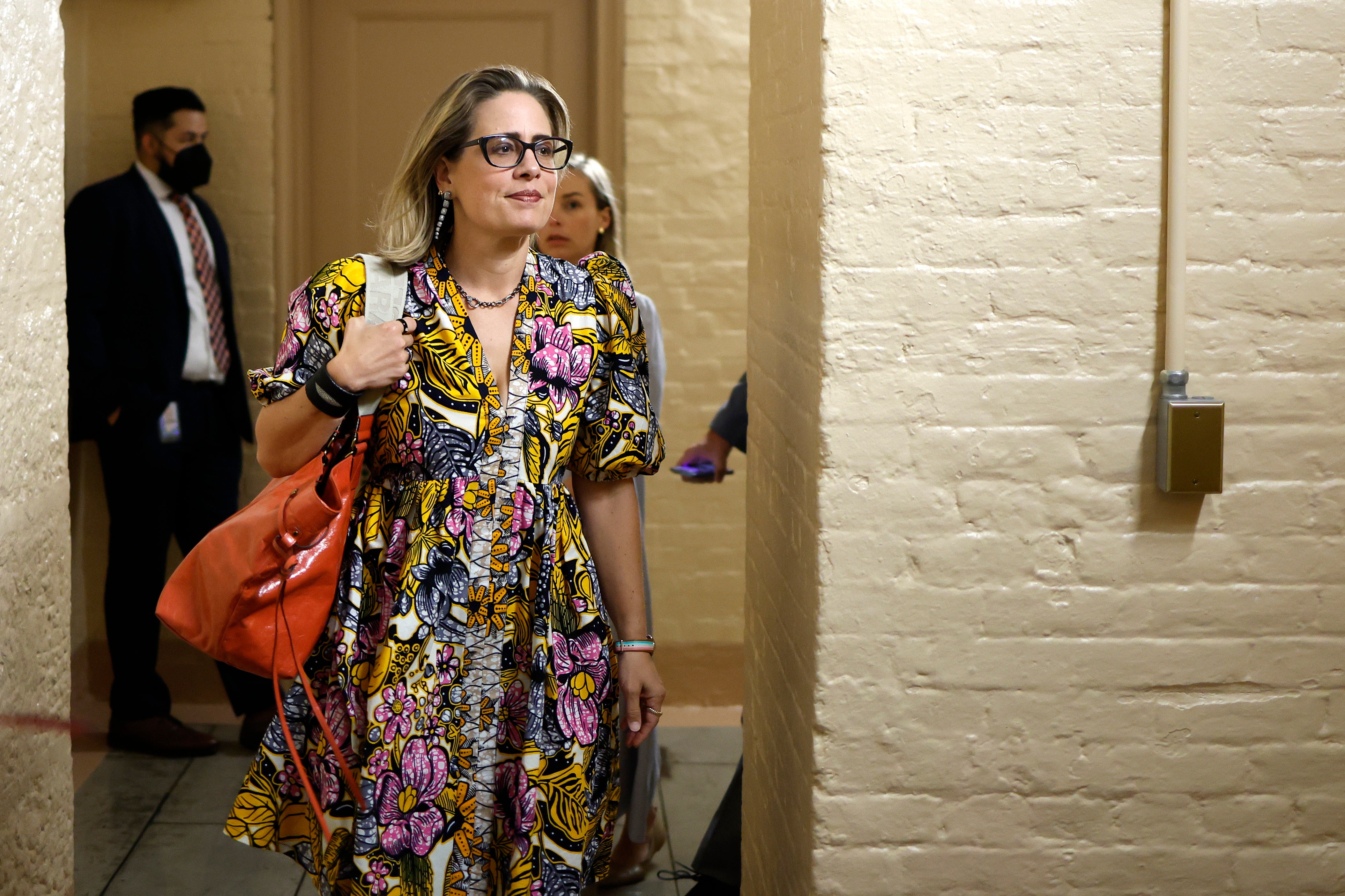Kyrsten Sinema changed her mind — but now Bernie Sanders is an issue
Joe Manchin was seen giving Sinema the hard sell earlier this week, and he looked like he was enjoying it. Her sudden decision to sign on to the latest bill was surprising and encouraging. Yet it’s hardly the end of the Democrats’ problems


Your support helps us to tell the story
From reproductive rights to climate change to Big Tech, The Independent is on the ground when the story is developing. Whether it's investigating the financials of Elon Musk's pro-Trump PAC or producing our latest documentary, 'The A Word', which shines a light on the American women fighting for reproductive rights, we know how important it is to parse out the facts from the messaging.
At such a critical moment in US history, we need reporters on the ground. Your donation allows us to keep sending journalists to speak to both sides of the story.
The Independent is trusted by Americans across the entire political spectrum. And unlike many other quality news outlets, we choose not to lock Americans out of our reporting and analysis with paywalls. We believe quality journalism should be available to everyone, paid for by those who can afford it.
Your support makes all the difference.Senate Majority Leader Chuck Schumer announced on Thursday that the Senate would reconvene on Saturday for a vote on a motion to proceed with the Inflation Reduction Act of 2022.
Many people expected the vote on the Democrats’ signature climate and health care legislation to happen over the weekend, so Schumer’s announcement was not that surprising. What was shocking – and perhaps a bit perplexing – is that Schumer was willing to do this despite the fact that the legislation still has no guarantee of passing. Specifically, Kyrsten Sinema — the conservative Arizona Democrat who has vexed colleagues in her party — had yet to pledge her support.
Incidentally, when the Majority Leader approached his lectern and announced the next time the Senate would meet, Sinema was seen chatting with Joe Manchin, whom Schumer had just spent months courting before the two struck a deal last week. But since Democrats have only 50 Senate seats, that means that they need to wrangle every member of their caucus to vote for the legislation before calling on Kamala Harris to break the resulting tie. Sinema is just as important.
Specifically, Sinema didn’t pledge her immediate support because she objected to closing what is often known as the “carried interest loophole”. As things stand, the tax code allows for general partners of a private investment fund such as a hedge fund or a venture capital firm to have their income taxed as capital gains rather than as income. Since capital gains is taxed at a lower rate, many Democrats consider this an unfair advantage for the wealthiest individuals in America.
With this hurdle still in place, it was hard to know what Sinema was thinking. The “Manchinema” moniker — often deployed to describe the positions of Sinema and Manchin in the same breath — implies a mind-meld between the two most famous conservative Democrats. But that muddles the facts, as the two actually diverge on a lot — including their approaches to the press.
Where Sinema’s silent treatment of the Capitol press corps makes her position on any particular topic inscrutable, Manchin often relishes being in front of a camera (except when he tells us “Just get out of my way if you will”). On Thursday, when your reporter tried to speak to him, he told me that there would be a press gaggle.
The gaggle never came – though at one point during his huddle with Sinema, Manchin glanced up at the Senate press gallery and gave a slight grin. It seemed he was having a good time making the hard sell.
Then, on Thursday evening, the unthinkable happened: Sinema released a statement saying that she and Democrats had reached an agreement. “We have agreed to remove the carried interest tax provision, protect advanced manufacturing, and boost our clean energy economy in the Senate’s budget reconciliation legislation,” she said.
This isn’t to say Democrats are in the clear. They now have to wait until Senate Parliamentarian Elizabeth MacDonough finishes the scrub of the legislation in a process known as the “Byrd Bath” – named for Manchin’s West Virginian predecessor, Robert Byrd – which determines whether budget legislation is “extraneous”.
Similarly, the reconciliation process requires a “vote-a-rama,” wherein the Senate votes at least 15 times within one day. A vote-a-rama often allows for members to propose various amendments to legislation. That could give the GOP an opening to try and burden the bill too heavily for it to pass: Senator Bob Menendez of New Jersey warned on MSNBC earlier this week that he would sink the legislation if Republicans put in poison-pill amendments regarding immigration.
But it’s not just Republicans who might try and amend it. Earlier this week, Senate Budget Committee Chairman Bernie Sanders decried the legislation for leaving out many parts of the proposed Build Back Better bill that Manchin ultimately killed.
“Now is the time for every member of the Senate to study this bill thoroughly,” the Vermont Senator said, “and to come up with amendments and suggestions as to how we can improve it.”
This article was amended on 8 August 2022. It previously referred to Chuck Schumer as the senate minority leader, but he is the senate majority leader.
Join our commenting forum
Join thought-provoking conversations, follow other Independent readers and see their replies
Comments